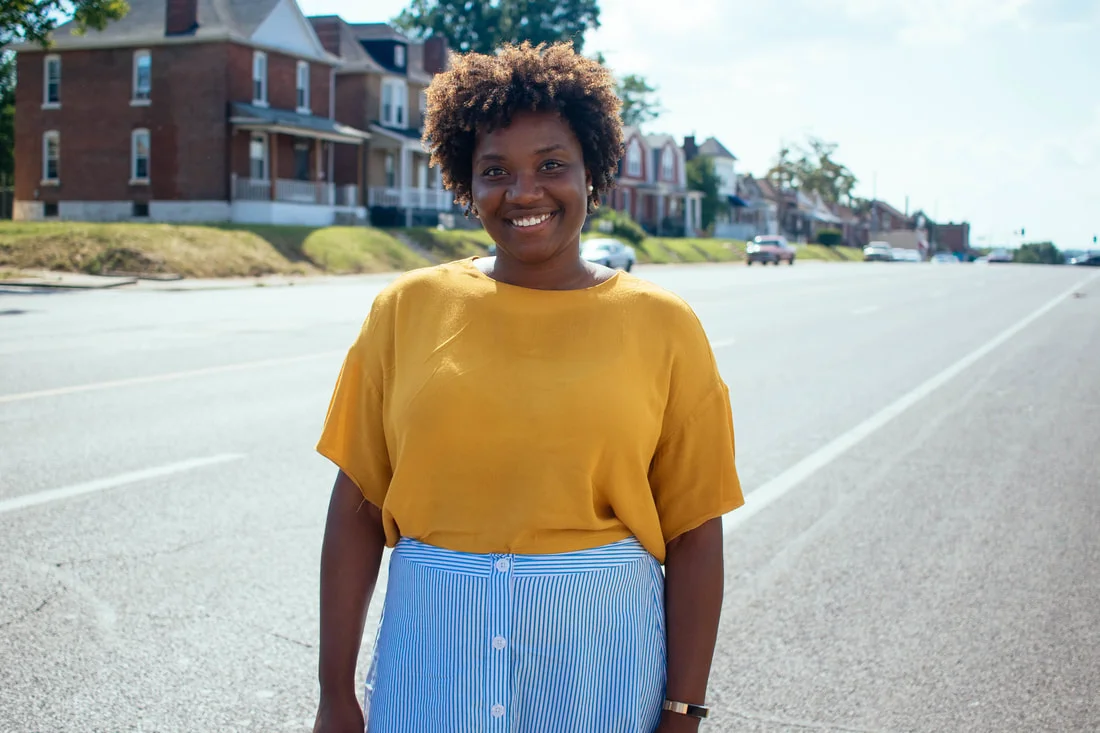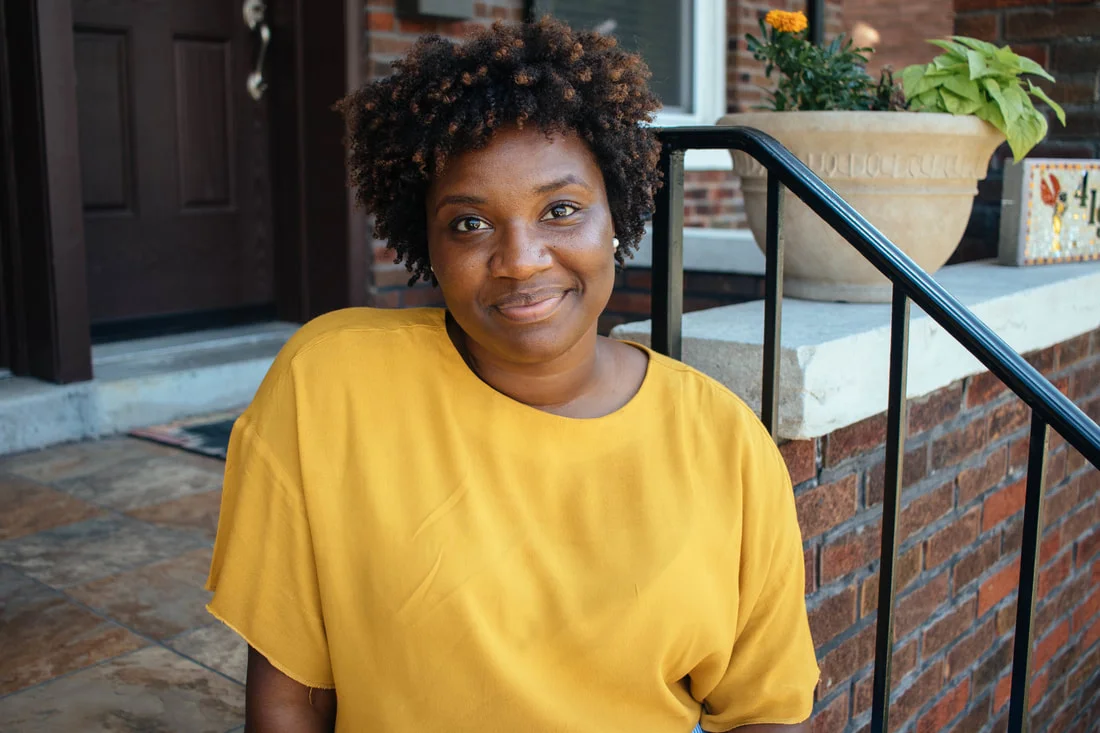On Reading Out loud and Encouraging Imagination
On Reading Out loud and Encouraging Imagination
MONTI HILL

Monti Hill, a power-builder in WEPOWER’s inaugural Education Power-Building Academy in North St. Louis city, pictured here on Natural Bridge Road near her home // Photo by Kristen Trudo
On reading out loud.
One afternoon in grade school my teacher made up a new rule: each student must finish reading a section aloud from their book before leaving the classroom that day. I couldn’t make it through a page. I was stuttering so badly. Then to add to my embarrassment, I caused my classmates to miss their bus.
Even though I never thought that I would be able to go to college, I was still active in high school. I was involved in the fun things that came easy to me — clubs, accelerated science, art. My mom entered me in a lot of art contests. I would draw and doodle. The opportunity to be creative drew my attention.
I didn’t recognize it at the time like I do now, but my mom was encouraging me to create vision boards. She allowed me the space to imagine things at home — to create visions about my future in a way I couldn’t at school.
The academic piece — especially reading heavy classes — was another story. I didn’t focus on it. There was no support at my school for students that felt lost or couldn’t articulate what they needed. No one was pushing or challenging me in those spaces. No one was there telling me it was okay to read, okay to practice — that it could be fun!
And so when high school ended, I didn’t enroll in college — didn’t do anything. Then three days before the school year started, my mom took me by bus to a community college. She was very emotional. She knew that my friends were going to school, and she wondered what I was gonna do. It was one of those moments where she didn’t know what she should do, but she knew to tell me, “Community college is one option.” The other one was to get a job. So I enrolled.
Years of not being challenged in high school left a lasting mark; I couldn’t read a book. I thought to myself, “Where were the teachers and support staff all those years in school?” And I’m not even blaming them — but I hadn’t been taught how to challenge myself.
In community college I was on my own. I thought, “I’m grown as hell, and I don’t know what to do.” I saw where other folks were, and where I wanted to be. But I couldn’t get there unless I went through the process. I knew that process included going to classes and reading in front of people. I saw reading as a barrier — but if I didn’t attempt to get over it, I was going to stay stuck.
So I signed myself up for all of these remedial classes. After a year in community college, I transferred to Prairie View A&M University. There I completed additional remedial classes. All throughout college I would go to the bleachers and read out loud. That’s how I started to learn words. The process inspired me.
These days, during WEPOWER trainings, Charli has us read worksheets and quotes aloud to one another. The other day one of us misread a word, and we all giggled — not in judgement — but in comfort. We’re really close with one another, having spent two days a month together since April, learning and growing. The care-free space allows us to not get stuck on small embarrassments. It’s necessary to create spaces where our backgrounds are not hidden and our abilities are celebrated — where we build confidence and self-esteem in one another. This needs to happen more often in our public schools — but also in our political organizing spaces.

Monti Hill, on her front porch // Photo by Kristen Trudo
On improving public education.
I want to improve public education for the voices that are not being heard. I wish I had had access to some type of guidance or mentorship — or even tools for my mom to better know how to support me. That’s why I worked as a case manager at Roosevelt High School for three years. Students shouldn’t feel alone in the fight for their education. I worked really hard to be the person that I needed when I was in school. I think people are more aware of inequities now, but in our communities, people don’t really have time to focus on their child’s education like privileged people do.
I feel like I’ve come so far, and I know that many people have been through the same thing. When I think about improved public education, I think about how self-esteem might be impacted in certain communities. I think when people feel good and confident about what they’re learning and doing, they’re more forward. When people feel ashamed, they don’t speak up in spaces. When a child who knows how to play the piano or violin or read at an advanced level, there’s something going on there. It’s self-esteem building.
When I think about a future with improved public education, I think about young people who care about what’s going on in their space — and who urgently want more for their community. I want a world where youth aren’t forced to leave their communities. Instead they could come back into their own and work — come back and continue to improve it.
Today I work on campaigns and continue designing through the name Black + Brown. I see a future for myself and a future for the region in supporting progressive candidates. I worked on Tishaura Jones’ campaign. Then I worked on a shoestring budget getting Jason Wilson elected to the school board. On that campaign I learned how to write, communicate with constituents on social media, and develop websites. Winning that campaign solidified my belief that our dream of widespread progressive Black and Brown elected leadership is possible.
On daring to create.
I think I have the ability to empower other people. And to guide them in the right direction. I used these skills when I was a case manager, but I am thinking that maybe I don’t use them enough for myself. For example, I really want to support Black and Brown political candidates and get their names out there. But I’ve also begun to ask myself a question: “Am I just trying to amplify their narrative? Or is it something that I want to do for myself, too?” I’m not sure. I don’t think I have appreciated me enough.
So I joined WEPOWER because it encourages us to think creatively with what we have. What brought me in was knowing that Black and Brown people created it. We are already doing things in our home, in our community, and in how we talk to people. Once we can identify the root illness as systemic oppression, we can move past the idea that we cannot change certain things. Many of us feel like we can’t have businesses in our space — or have roundtable discussions in our community. We don’t imagine that we can do it — but we can!
I’m currently leading outreach efforts with a congressional campaign in Southern Illinois. We’re trying to flip the district blue! I work with community leaders and established groups to host roundtable discussions on local issues and build energy for change.
On power-building.
I think when you begin to understand your story, you can work to empower people around you. Like in politics, I’ve come to believe that I have to be spot on with a lot of things, but I’m not perfect. In fast-paced campaigns there is no extra time. I need to be on-point all the time. Campaigns are full of young, mostly white professionals, so it’s assumed that reading just came through schooling. I hear co-workers talk about their education — AP Government, AP Political Science, AP English. Those were not part of my experience. I’m over here battling with “Did I spell that word correctly?” or “Am I saying that word correctly?” So I get nervous in these spaces. I worry that people will notice when I take too long to read or complete reading-heavy tasks. I come into work early and stay late to make due.
In this city everybody knows everybody, and I’m over here still trying to discover Monti. But through storytelling I’ve realized that I’ve come so far. This self-recognition helps me when I’m in uncomfortable spaces.
